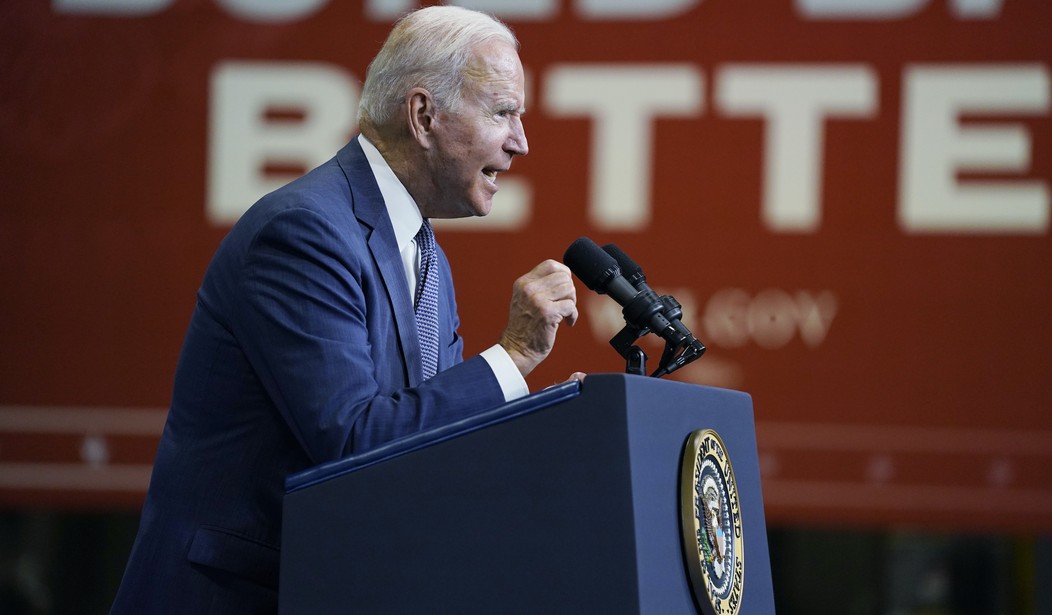Let’s just say up front that there continue to be conflicting signals about whether or not inflation is a very short term problem or something that might last a while. Just today, Goldman Sachs released a research note saying inflation resulting from supply-chain issues will continue into next year but will be on a steep decline and should be back around 2% a little over a year from now. But the alternative view, that inflation could be around longer is picking up steam and that could be very bad news for President Biden.
Today, the NY Times notes that a critical metric called the break even point, an estimate of what investors in the bond market think inflation will be going forward, jumped up to about 3 percent for the first time in more than a decade last Friday.
A key measure of the bond market’s expectations for inflation over the next five years — known as a break even — rose to a new high Friday, briefly topping 3 percent. That meant investors expected inflation to average about 3 percent a year for the next five years, far higher than any time in the decade before the pandemic hit. Measures of inflation expectations over longer periods, such as over the next 10 years, also rose to multiyear highs…
While the Fed chair, Jerome H. Powell, and other central bank officials have spent months saying higher inflation was a “transitory” result of pandemic-driven supply chain problems, there has lately been good reason to believe that price rises could be a more lasting concern…
…analysts say the crucial concern for bond market investors was that prices seemingly unrelated to the pandemic were also beginning to move higher. Foremost among them was monthly rents, which tend to rise for long stretches once they start moving upward. Rents jumped 0.5 percent from August to September, the quickest rise in about 20 years.
Energy prices also jumped 25 percent last month, driven by sharp increases in gasoline and fuel oil costs. Rising crude oil prices are behind the surge, and there is little sign that those pressures are going away any time soon.
When bond investors look at all of these surging prices, they move their investments from regular bonds to inflation-protected bonds. This article from Yahoo News explains how comparing the yields of the two types of bonds gives an estimate of what investors in this market think inflation will be over a given time period:
So, let’s say that you have a 10-year CD (certificate of deposit) that has yielded 5% over the course of the investment (nominal yield). You also hold an inflation-linked investment that has yielded 2.9% over the same time period (real yield)…
In this case, your breakeven inflation rate is 2.1% (5 – 2.9 = 2.1)…
This would indicate that over the next 10 years, today’s investors expect inflation to average around 2.1%. Of course, that number isn’t guaranteed. It’s simply an expectation based on the inflation rate of today and over the last 10 years.
Using that same example: if you believe that in the next 10 years, inflation will average more than 2.1%, you may want to consider purchasing Treasury inflation-protected securities (TIPS). If you believe that inflation will average less than 2.1% in the coming decade, a nominal Treasury might be the better choice for your portfolio.
The NY Times was specifically looking at the break even rate on five-year bonds, which is at 2.99 today. So investors buying up inflation protected bonds are essentially betting that inflation over the next five years will be higher than 2.98 percent. If it is, they’ll make more on those protected bonds than they would have on regular (non-inflation adjusted) bonds. Again, that doesn’t mean it will happen, it just means that serious investors are betting it will and because these are big-time investors the Federal Reserve will pay attention to those expectations.
Elsewhere, the Times points out that longer term inflation would be very bad news for President Biden and Democrats in general.
An inflation surge is presenting a fresh challenge for Mr. Biden, who for months insisted that rising prices were a temporary hangover from the pandemic recession and would quickly recede. Instead, the president and his aides are now bracing for high inflation to persist into next year, with Americans continuing to see faster — and sustained — increases in prices for food, gasoline and other consumer goods than at any point this century.
That reality has complicated Mr. Biden’s push for sweeping legislation to boost workers, expand access to education and fight poverty and climate change. And it is dragging on the president’s approval ratings, which could threaten Democrats’ already tenuous hold on Congress in the 2022 midterm elections.
Recent polls shows Americans’ concerns over inflation are eroding their economic confidence and dimming their view of Mr. Biden’s performance.
Democrats were already facing an uphill battle in next year’s midterms but put that aside for a moment. No matter what else it’s about, every presidential election is about the economy. If inflation is high for the next three years, the argument for Biden’s reelection (or that of Kamala Harris if Biden bows out) will evaporate like people’s paychecks. Indeed, the Times notes some economists are already saying the inflation we’re seeing is self-inflicted, the result of handing out too much money during a supply chain crisis:
Some economists, including veterans of previous Democratic administrations, say much of Mr. Biden’s inflation struggle is self-inflicted. Lawrence H. Summers is one of those who say the stimulus bill the president signed in March gave too much of a boost to consumer spending, at a time when the supply-chain disruptions have made it hard for Americans to get their hands on the things they want to buy. Mr. Summers, who served in the Obama and Clinton administrations, says inflation now risks spiraling out of control and other Democratic economists agree there are risks.
“The original sin was an oversized American Rescue Plan. It contributed to both higher output but also higher prices,” said Jason Furman, a Harvard economist who chaired the White House Council of Economic Advisers under President Barack Obama.
Higher inflation sets the country up for a change election in 2024 and that’s bad news for Joe Biden and Democrats.









Join the conversation as a VIP Member